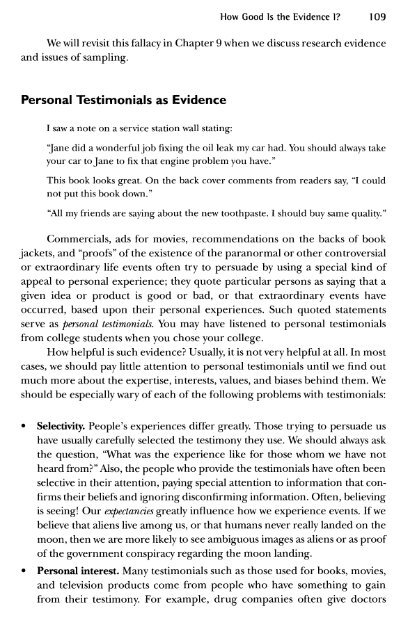Asking the Right Questions, A Guide to Critical Thinking, 8th Ed
Asking the Right Questions, A Guide to Critical Thinking, 8th Ed
Asking the Right Questions, A Guide to Critical Thinking, 8th Ed
You also want an ePaper? Increase the reach of your titles
YUMPU automatically turns print PDFs into web optimized ePapers that Google loves.
How Good Is <strong>the</strong> Evidence 1? 109<br />
We will revisit this fallacy in Chapter 9 when we discuss research evidence<br />
and issues of sampling.<br />
Personal Testimonials as Evidence<br />
I saw a note on a service station wall stating:<br />
'Jane did a wonderful job fixing <strong>the</strong> oil leak my car had. You should always take<br />
your car <strong>to</strong> Jane <strong>to</strong> fix that engine problem you have."<br />
This book looks great. On <strong>the</strong> back cover comments from readers say, "I could<br />
not put this book down."<br />
"All my friends are saying about <strong>the</strong> new <strong>to</strong>othpaste. I should buy same quality."<br />
Commercials, ads for movies, recommendations on <strong>the</strong> backs of book<br />
jackets, and "proofs" of <strong>the</strong> existence of <strong>the</strong> paranormal or o<strong>the</strong>r controversial<br />
or extraordinary life events often try <strong>to</strong> persuade by using a special kind of<br />
appeal <strong>to</strong> personal experience; <strong>the</strong>y quote particular persons as saying that a<br />
given idea or product is good or bad, or that extraordinary events have<br />
occurred, based upon <strong>the</strong>ir personal experiences. Such quoted statements<br />
serve as personal testimonials. You may have listened <strong>to</strong> personal testimonials<br />
from college students when you chose your college.<br />
How helpful is such evidence? Usually, it is not very helpful at all. In most<br />
cases, we should pay little attention <strong>to</strong> personal testimonials until we find out<br />
much more about <strong>the</strong> expertise, interests, values, and biases behind <strong>the</strong>m. We<br />
should be especially wary of each of <strong>the</strong> following problems with testimonials:<br />
• Selectivity. People's experiences differ greatly. Those trying <strong>to</strong> persuade us<br />
have usually carefully selected <strong>the</strong> testimony <strong>the</strong>y use. We should always ask<br />
<strong>the</strong> question, "What was <strong>the</strong> experience like for those whom we have not<br />
heard from?" Also, <strong>the</strong> people who provide <strong>the</strong> testimonials have often been<br />
selective in <strong>the</strong>ir attention, paying special attention <strong>to</strong> information that confirms<br />
<strong>the</strong>ir beliefs and ignoring disconfirming information. Often, believing<br />
is seeing! Our expectancies greatly influence how we experience events. If we<br />
believe that aliens live among us, or that humans never really landed on <strong>the</strong><br />
moon, <strong>the</strong>n we are more likely <strong>to</strong> see ambiguous images as aliens or as proof<br />
of <strong>the</strong> government conspiracy regarding <strong>the</strong> moon landing.<br />
• Personal interest. Many testimonials such as those used for books, movies,<br />
and television products come from people who have something <strong>to</strong> gain<br />
from <strong>the</strong>ir testimony. For example, drug companies often give doc<strong>to</strong>rs



